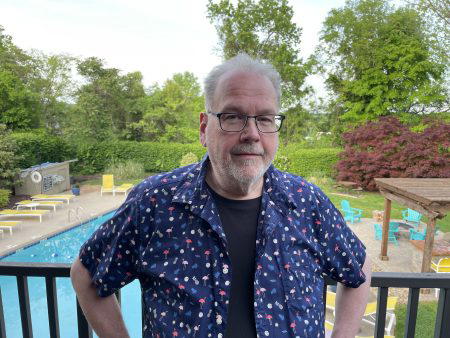“You got the best view in town, Casey. An unobstructed view of the jail.”
Behind the counter of the little diner, she laughed.
I was sitting at the counter having coffee and an egg sandwich. Down one stool from me was McCullough, the bail bondsman from the office next door.
“I sure wouldn’t trade my office for the world,” McCullough said. “You’ve been in the jail, right? I mean, as a visitor?”
I nodded.
“So you know where the intake desk is, right? That big window off the intake desk,” McCullough said. “They can see my bail bonds sign as they’re being booked. When they get their phone call, my number, in big red neon, is right in front of ‘em.”
“So if you’re their first call when they get arrested, what’s their first call when they get released?”
Casey topped off our coffees. “They don’t call, but about half of ‘em come over here.”
McCullough chortled. “I gotta admit, your breakfast is better than the baloney sandwich they get three times a day in jail.”
“They don’t come over for breakfast,” she said.
“So why do they come over?” I asked.
She picked up McCullough’s plate, prompting him to complain that he wasn’t done sopping up his runny eggs with his toast yet, but she took it away anyway. That’s just the kind of relationship they have, I guess. She walked back over and stood in front of us.
“You know how when you get booked into jail, they take all your stuff, your wallet and money and pocket change and rings, and they keep it until you’re released?”
I nodded. McCullough leaned back and folded his arms and looked like he’d heard this before.
“You know how they store it? What they keep it in?”
“I dunno, a paper bag?”
I could see McCullough shaking his head.
“They shrink wrap ‘em,” Casey said.
“They do what now?”
“They shrink wrap all the stuff from your pockets. It’s sealed between two sheets of plastic, like the action figures I buy for my kid.”
“No shit?” I asked. “But why do they come over here?”
“Because they don’t cut the plastic off when you’re released. They send you out the door with your stuff shrink-wrapped. So those guys come over here and borrow my scissors so they can get their stuff out of plastic.”
Right then, we all looked up because we heard the little electronic ding of the front door opening. A guy walked in, long hair, scraggly beard, wearing flip-flops and shorts and a T-shirt that read, PEOPLE = SHIT.
He had a big sheet of plastic in one hand. He walked up to the counter and looked at Casey and held up his belongings, which looked like a wallet and some change and a pack of cigarettes and a pocketknife.
“Can I use a pair of scissors?” the guy asked. Casey handed over a pair from behind the counter and the three of us watched while he hacked away at the plastic. When he had finally made some headway, he handed the scissors back to Casey. He tore the plastic open and got his wallet and stuff out.
When he got the pocketknife in his hand, he opened it and stepped closer and reached across the counter, pointing the knife at Casey.
“Gimme what’s in the register,” he said.
Without hesitation, Casey took the scissors and brought them down, piercing the back of his hand and pinning it to the counter. The guy started screaming as blood squirted from his hand.
McCullough and I jumped off our stools and stepped back, but Casey was still calm and cool. She looked at McCullough.
“Call 911, will ya?” she asked. Then she added, “I’m gonna have to hang a sign in the window.”
“What – what kinda sign?” I asked.
“Restrooms and scissors for paying customers only.”


